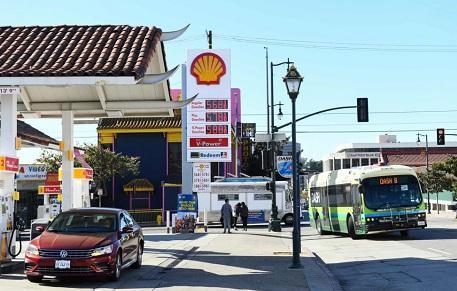
Two Saudi officials told The Associated Press the Saudi energy minister informed the Organization of the Petroleum Exporting Countries, or OPEC, of the kingdom’s commitment to the group’s current roadmap of cautious monthly increases. They spoke anonymously because they were not authorized to brief journalists.
Saudi Arabia will not push for changes to an agreement with Russia and other producers that has kept a lid on oil production levels, according to media reports.
This has concerned Washington as gasoline prices rise and tensions with Russia over Ukraine fuel market uncertainty.
The U.S. administration dispatched Brett McGurk, the National Security Council’s Middle East coordinator, and the State Department’s energy envoy, Amos Hochstein, to Riyadh on Feb. 16 to talk about a range of issues - chief among them the ongoing war in Yemen and global energy supplies.
On Feb. 17, Emily Horne, the spokesperson for the White House National Security Council, said the officials discussed a “collaborative approach” with the Saudis to manage potential market pressures stemming from a possible Russian invasion of Ukraine.
King Salman also said as much in a call last week with President Joe Biden. According to a Saudi readout of the call, the king highlighted the “the importance of maintaining the agreement” that is in place between OPEC, the oil cartel led by Saudi, and Russia.
The Saudi and Russian-led alliance, known as OPEC+, calls for gradual increases to oil production as the world continues to emerge from the pandemic, but geopolitical events have been rapidly evolving and driving market volatility.
Higher prices at the pump pose a threat to Democrats at the polls in upcoming midterm elections. Benchmark crude is trading at around $95 a barrel, its highest level in eight years. The current U.S. national average for a gallon of regular gasoline costs around $3.50 - a 40 percent increase from its average of $2.50 at this time last year.
During a CNN forum in October, U.S. President Joe Biden said prices were rising because “of the supply being withheld by OPEC.”
His remarks were widely interpreted as a swipe at Saudi Crown Prince Mohammed bin Salman, who oversees the kingdom’s major policy decisions and day-to-day affairs.
Saudi Arabia has the ability to produce some 12 million barrels a day, but its output is around 10 million barrels a day in line with the OPEC+ curbs made during the coronavirus pandemic.
The OPEC+ group has consistently rebuffed pressure from Biden to pump significantly more oil, deciding instead to stick with cautious monthly increases. The higher oil prices are a boon to the economies of both Saudi Arabia and Russia as Moscow faces possible Western sanctions over Ukraine.
The Wall Street Journal reported that at an energy forum in Riyadh on Feb. 16, Saudi Energy Minister Prince Abdulaziz bin Salman rejected calls to pump more oil and said renegotiating quotas among OPEC members risked stoking more volatility in oil markets.
At the energy forum in Riyadh, Hochstein, the State Department’s energy envoy, stressed “energy security cannot be taken for granted.”
“We have seen a rapid rise in price and today having a significant amount of risk, of geopolitical risk, priced into our markets,” he said at a livestreamed International Energy Forum symposium. High oil prices and high inflation are cyclical and affect each other, he added.
Oil producers, he said, need to “make sure that the supply is there to meet the demand” so that prices do not continue to strain the U.S. economy and wider economic recovery.
Speaking at the same energy forum, the head of the International Energy Agency called on OPEC+ producers to close what he said is a 1 million barrel-per-day gap between their stated targets and actual output. The IEA says Saudi Arabia and the United Arab Emirates could help stabilize prices if they pumped more oil.
IEA Executive Director Fatih Birol called on OPEC+ producers to “provide more volume to the markets” to reduce price volatility that is burdening households.